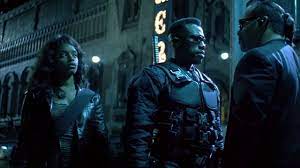Blood raves, bullets, and bad one-liners make up Marvels first feature length adaptation of their comic books. 1998's Blade follows vampire hunter Blade (Wesley Snipes) as he faces off against Deacon Frost (Stephen Dorf). Blade learns he is a human-vampire hybrid "chosen one", and the only living thing on earth with the blood necessary to summon the Blood God, a vampire entity with the power to wipe out humanity. Along the way, Blade discovers family secrets, trains under his mentor Whistler (Kris Kristofferson), and helps a vampire newcomer named Karen (N'Bushe Wright) navigate New York's vampire infested crime world and save humanity.
Trailer:
Film Significance:
The pioneer of the 2000s superhero movie craze, Blade set the stage for a new era in filmmaking. It was the epitome of a cheesy 90s action movie, with goofy dialogue and cheesy special effects, but it has a good amount of earnestness and heart. This tone would carry on in X-Men and Spider-Man and launch comic book movies into the public consciousness, movies we still watch today. Not only did it set the formula for a new film genre, but it also broke barriers by delivering a classic "chosen one" narrative with a black lead hero. In an era dominated by white action stars like Arnold Schwarzenegger, Bruce Willis, and Sylvester Stallone, Wesley Snipes delivered a classic action movie narrative that followed two black lead characters. At a time when black actors weren't landing as many lead blockbuster roles, Blade served as an empowering standard that challenged Hollywood conventions. Blade was ahead of its time, and is much more important to the current landscape of filmmaking that it gets credit for.
Discussion Questions:
Violence in comic books has been controversial forever, and the same has been the case for comic book movies. When Blade first came out, it was criticized for being too violent as it was based on a comic book (which many critics thought were predominantly targeted at kids). Do you think there's any merit to this argument?
It has become common in film criticism to put blame on the comic book movie craze that Blade kicked off for a lack of originality and funding for independent films. Others would argue that comic book movies have been around forever and aren't just a recent fad that is harmful to film.


Comments
Post a Comment